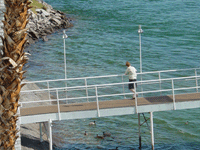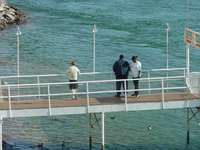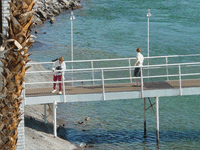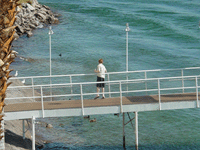
Feeding Wild Ducks by Lori Goodman / Live Ducks In many areas wild duck populations are becoming overly socialized and endangered because of human interference, especially feeding. Many public waterways, lakes and ponds prohibit interaction with wildlife, including ducks, for a good reason. Wild ducks need to eat the green foods that grow naturally in their environment in order to maintain good health and a normal lifespan. Their ability to fly and retain natural instincts for survival depends entirely on the foods they eat. By feeding wild (or dumped domestics) you are contributing to their early death, shortening their lives ten-fold. Disease, malnutrition, overbreeding, infighting, easy pickings for predators, are just a few of the problems that occur when people feed the ducks. Watch and observe Recently while on a trip, I watched one of 14 boat docks in close proximity for a full half hour. During that short time I saw 12 separate individuals feeding ducks from just one dock. Every dock had people on it, many of whom were feeding the ducks. For research purposes my attention was focused a small section of one dock and what I observed was shocking.
The average time an offender spent tossing food in the water was 5 minutes. There was often more than one offender at a time. Bread, popcorn and chips were the foods of choice. One woman emptied an entire snack bag of Doritos into the water. By the time I left there was soggy food floating along the banks, the ducks were ignoring the food, but waiting anxiously to see what was coming next. The biggest shock was that this was observed between 9:30 and 10:00am, on a weekday. The weekend crowds hadn't arrived. Changes in behavior I've observed in the 7 years I have visited this area, the wild ducks, mostly Mallards, have changed their behavior significantly. They once stayed in the water and had fear of people who came too close. They now live on land within 10 feet of most buildings. Their numbers have increased substantially. Several people I spoke with said they consider the ducks a nuisance. Many of the ducks appeared unhealthy and less active than in past years. While I was walking Killer, my Pomeranian, she approached a few of the ducks who did not show any signs of fear, they simply stepped out of her way as she walked past. I also noticed a dramatic increase in aggressive behavior and in-fighting over the past year. What was once a serene place to observe ducks in their natural environment has quickly grown out of control. As a long-time fan of wild and domestic ducks, witnessing these behavioral changes in such a short period of time was an eye-opener, even to me. 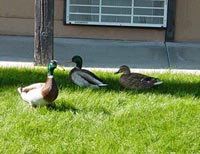 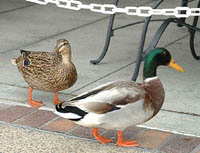
Mallards (wild duck breed), seen unnaturally cohabitating in human environments To my disgust, several mean-spirited people entertained themselves by tossing in a small bit of food and watching the ducks fight over it. I was amazed at how many parents joined in or encouraged this, and didn't use the opportunity to teach their children to respect wildlife. If you care about ducks, do not feed them Enjoy their natural beauty from a distance and protect their survival. Keeping your snacks to yourself. You may think you are the only one feeding them so you're not doing any harm, but be assured that as soon as you leave another offender takes your place. Safe alternatives Are there any safe foods we can feed the ducks? No, no, and I'll say it again, NO. Attracting wildlife for the purpose of feeding it causes a complicated chain reaction of events that ends up with the ducks losing. The only humans that should feed wild ducks are Wildlife Officials or Parks and Recreation staff. Only these people can make the determination that the ducks survival depends on their intervention. They feed only approved food that meets strict standards and contains the nutrition the ducks need. Feeding is done in a controlled environment, unlike typical scenarios you'd find on public waters where duck feeding is out of control. Please do not contribute to this problem, be part of the solution. What you can do to help * Stop feeding the ducks * Politely tell others they are harming ducks by feeding them * Talk to city officials about posting warning signs at your local ponds and lakes * Encourage schools to teach young children to respect wildlife by not feeding it * Refer people to Live Ducks or this article for more information -Lori Goodman RELATED ARTICLES Breaking the Bread Habit |
Copyright © Live Ducks All rights reserved
